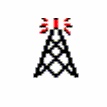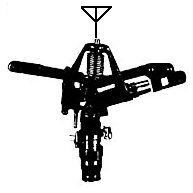
One of the developments we're seeing in amateur radio over recent years is the proliferation of VOIP and digital voice technologies. Examples of this are things like
D-Star,
IRLP, and
EchoLink. The latter is sometimes a contentious technology, in that some amateurs don't consider it "real" radio because the audio/control interface is PC-based. Once while on a visit to San Diego I was having a pleasant conversation with a local repeater operator which turned very sour at the mere mention of the word "EchoLink" as he went into a tirade about the evils of the system. Normally hams reserve this sort of loathing for
CB radio and
BPL companies, so I was a bit surprised.
Since then I've encountered a few more instances of "EchoLink Enmity". My personal opinion is that there's little difference between controlling a radio/repeater with EchoLink versus using
Ham Radio Deluxe plus
Skype to control a rig remotely. The question of whether EchoLink users are higher or lower on the amateur food-chain is best left to the philosophers. I
will concede however that there's an annoying element to EchoLink, but it's the fault of the developers and not so much the users themselves.
Allow me to explain: Most if not all EchoLink users are unaware that when they connect to a repeater or simplex link the server software by default transmits an announcement over the air which says "Connecting to EchoLink [callsign] -- Connected". Since a lot of EchoLink users are looking for QSOs (amateur-speak for conversations) they tend to hop from repeater to repeater looking for traffic. If a repeater's quiet, they tend to silently disconnect and go looking elsewhere. And again the server software by default transmits an announcement which says "[callsign] -- Disconnected". To the locals on the repeater, this can seem a bit rude. If the EchoLink user was looking for a QSO, then why didn't he transmit and ask if anyone was interested/available to chat? So throughout the day you hear a lot of Connect-Disconnect, Connect-Disconnect...over and over again. After a while, you might start to think that maybe EchoLink users really are bozos.
However I think the users are largely not to blame for this. The connection announcements are not played back to the EchoLink client's inbound audio, so users don't know about them unless they're listening to the repeater in question. Most EchoLink users connect to remote repeaters or links in other parts of the country or even around the world, so they often don't ever hear what goes out over the radio. I once sent a detailed email to the EchoLink developer team explaining all this. I was told that a repeater/link admin can turn off the announcements, but they're on by default. Most admins clearly don't bother to turn announcements off, and the users are unaware of them. I suggested to the EchoLink developers that they might want to add a note to the EchoLink FAQ/guide explaining all this, but they didn't. And so EchoLink users will continue to unwittingly annoy repeater users, and apparently the developers think this is OK. I don't understand this, but whatever. Therefore, here are my How Not To Be An EchoLink Bozo tips:
- Be aware that every time you connect/disconnect, your callsign is transmitted over the air.
- Knowing the preceding it should be no surprise why when I further suggest: Don't repeatedly connect/disconnect to the same repeater. It is amazingly annoying to the locals when you do.
- Try saying hello if it's quiet. You may be surprised at how many locals are listening and willing to come back and chat with you.
- Be careful about "calling CQ" on a repeater. CQ is traditionally used for simplex contacts, and a repeater is not a simplex system. Some people won't care, but others will think that you're a bozo. If the EchoLink node ends in "-R" it's a repeater and I advise against calling CQ. If the node ends in "-L" (a link node) then CQ is probably OK.
- Don't ask for a QSL card because you made a contact over EchoLink. People will think you're a bozo. For that matter; I will think you're a bozo. QSL cards are for commemorating simplex contacts. Would you send a QSL card to someone you chatted with over Skype?

